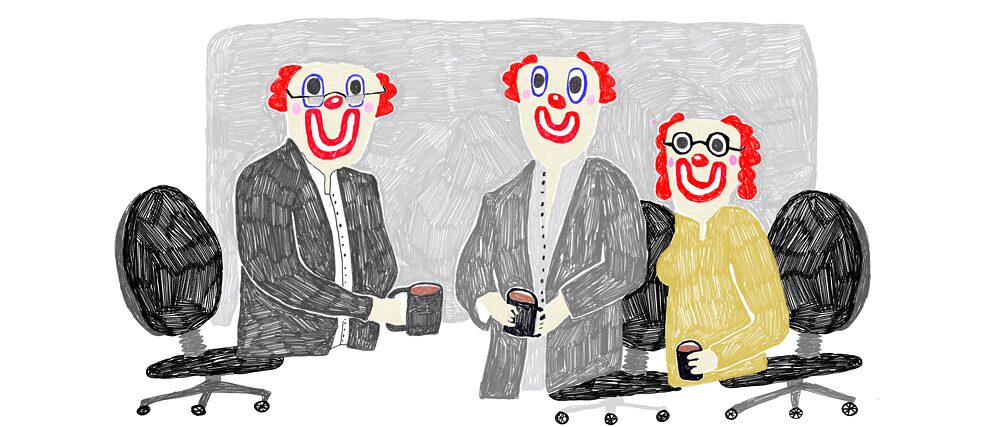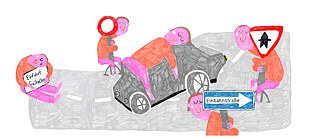Stereotypes have a bad reputation, but beneath their hard, often exaggerated, easy-to-parody surface – valuable, shiny nuggets of truth lay just waiting for us to dig up. Let’s excavate five of the biggest German stereotypes and see what gems of insight lie glittering underneath.
Last week I went to Munich and — despite commendable effort and rapt attention on my part — didn’t see a single punctual person, in socks and sandals, brusquely eating sausages, holding a beer bigger than their head, while following arbitrary rules, entirely humourlessly.
So, yeah, obviously stereotypes are completely wrong, right?
Not at all, Ausländer!
Stereotypes have a bad reputation, but beneath their hard, often exaggerated, easy-to-parody surface – valuable, shiny nuggets of truth lay just waiting for us to dig up.
Let’s excavate five of the biggest German stereotypes and see what gems of insight lie glittering underneath:
Stereotype 1: Germans are inflexible people obsessed with order and rules.
Truth: So? Rules are relaxing.
“I love a good rule,” my German friend, Jan, said, as he pored over the instructions for a new board game. “They’re relaxing.”
As anyone with a toddler will tell you, rules are not the enemy. Without rules, everything becomes a negotiation. Negotiations take time and effort and reward those best at the dark arts of persuasion, or in a toddler’s case, throwing things.
Of course, if you arrived here from a high context society, where rules are bendier than broken bananas, the German desire for order — likely an heirloom from the country’s stiff-but-prosperous Prussian past — can be a bit of a shock. Germany is a low context culture – so optimises for fairness and consistency above individuality. It thinks subtext is sub-optimal, guesswork is wasted work, systems set you free, and rules are relaxing.
After a little while here, I bet you’ll agree.
Stereotype 2: Germans are obsessed with insurance.
Truth: The best offence is a good defence.
Talking of toddlers, I was recently at a playground, where I met a rather frazzled German mother of two very rambunctious twins. “Want to know what I’ve learnt about parenting?” she asked, fixing me with an authoritative stare, “Ein Plan ist nur ein Wunsch.”
Germans have the reputation for being risk-adverse. Why might that be, do you think? Well… you don’t have to be a history buff to know that German society has spent a lot of the last hundred and twenty years stumbling into – or stumbling, dazed out of, and needing to rebuild from – one disaster or another. From the Weimar Republic to the Third Reich, and the division into its East and West.
The only constant here has been relentless change. Accordingly, Germans know that good intentions can still yield terrible results, reality is messier than a teenager’s bedroom, a plan is only ever a wish, and to borrow a line from sport – the best offence is a good defence.
Insurance is that defence. When in doubt, and you should always be in doubt, insure.
Stereotype 3: Germany has a qualification fetish.
Truth: Confidence is no substitute for competence.
One morning, I was at my German employer, eating a breakfast cookie (absolutely a thing!) when an e-mail arrived informing us all to assemble for a *special* company meeting: the new, very enthusiastic American CEO had arrived. We trudged in. I wiped a crumb off my chin and sat down. A door at the front opened and out barrelled a woman with the energy of ten who whoop whooped onto the stage like a Vegas motivational speaker. Finding us all too sluggish, she demanded we get on up and do a series of fist pumps and animal grunts designed to both unite and excite us.
I got straight up, of course, mesmerised – but my German colleagues did not. To say their reaction was muted is like saying there was a light splash when the Titanic sunk. It was as if their shoes were glued to the floor. Mega cringe occurred. Eventually, the American realised her mistake, took it down a notch, then twenty-seven more.
Germany has been led badly astray by charismatic but unqualified charlatans. They have learnt from that and today, competence is more prized than confidence and charisma. This is why the nation’s politicians are so resolutely boring. Why there are so few funny zingers zipping around the floor of Bundestag. If people don’t want to trust their gut, what can they trust in? Qualifications. Whoop whoop!
Stereotype 4: Germans love their cars
Truth: Germany needs its cars industry.
When I was struggling to learn German, which consisted of me sitting around complaining bitterly about its eccentricities, my friend Simone said, “you don’t have to like the language yet, you just have to respect it. Some of the smartest things ever written were written in this language.”
Yesterday, I was biking down a busy road to go buy breakfast cookies (still a thing!) when an enormous shiny black Audi swerved to overtake another even more enormous shinier blue Audi and came all of about five centimetres away from smashing me into man-pulp.
A nearly daily occurrence on Neukölln’s road, and as I was shaking my fist, committing several murders in my mind, and trying to understand why… I thought of Simone. German society is built around cars because so much of it is built because of cars. They’re not just transportation vehicles, they’re one of the country’s largest economic vehicles. You don’t have to like cars, but living here, you should be able to see why they are respected.
 That’s why Germans love to propagate their own stereotypes: Make one joke a week and you’re the office comedian.
| Photo (detail): © Susi Bumms
Stereotype 5: Germans are unfriendly, direct, serious and humourless.
That’s why Germans love to propagate their own stereotypes: Make one joke a week and you’re the office comedian.
| Photo (detail): © Susi Bumms
Stereotype 5: Germans are unfriendly, direct, serious and humourless.
Truth: That’s what they want you to believe.
After I moved here, I noticed a strange phenomenon – the people who kept bringing and making fun of German stereotypes were not us foreigners, but Germans themselves (often to great comedic effect). It took me some time to work out why. Not all countries’ stereotypes are equally easy to live up to (or defy if negative). Do you know how much pressure us Brits feel to be funny? It’s no joke. And I’m cramping up just thinking how tiring it must be need to gesticulate like an Italian. Even Canadians must sometimes need a break from being jolly, right? Mexican heads must grow weary under the weight of those sombreros.
Some stereotypes work their countrymen and women hard. Not so, German stereotypes. They’re just expected to be humourless, punctual and uptight. Make one joke a week and they’re the office comedian. Arrive ten minutes late for a business meeting and they’re social renegades. Park against the gehweg (sidewalk) and they’re practically Che Guevara. And this, I think, is why they love to propagate their own negative, outdated stereotypes, thus lowering expectations upon themselves which they then get to casually, effortlessly surpass, to everyone’s amusement.
They’re not going to let their stereotypes go, and neither should you, humble Ausländer – because the truth is there, beneath the surface. Happy digging!
Related Links
December 2022
